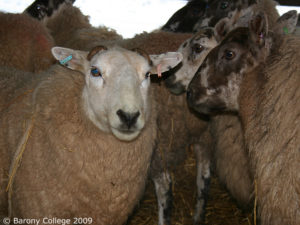Iodine and Pregnant Ewes
1 February 2017Iodine is stored in the thyroid gland where it is incorporated into a hormone which controls metabolic rate. Ewe Iodine requirements increase during the winter and the thyroid store can be used to make up any dietary deficit. This is not the case for foetuses which produce their own thyroid hormones from around day 50 of gestation and rely on a daily intake of Iodine in the ewe’s diet. Two problems can arise:
Iodine deficiency
This causes enlargement of the lamb thyroid glands which are usually no bigger than kidney beans. Iodine deficient lambs are often poorly fleeced and are prone to hypothermia and perinatal death. They may be stillborn as thyroid hormones also have a role in lung maturation. Goitre can be grossly obvious and the normal thyroid: bodyweight ratio should be <0.4g/kg.
Iodine oversupply
Increased neonatal lamb deaths can occur if ewes are over-supplemented with Iodine in late gestation – particularly during the last 2 weeks. This effect has not been demonstrated in cattle. The absorption of immunoglobulins from colostrum is reduced via an unknown mechanism. Affected flocks, which are often well managed, experience unusually high mortality rates in neonatal lambs. Despite good intakes of quality colostrum low ZST results in lambs less than one week of age are a consistent finding. This leaves the lambs vulnerable to infection and death due to bacterial infections. Ewe daily Iodine requirement is around 0.5mg/day and research has concluded that intakes should be less than 10mg/day. Access to multiple mineral sources is a risk factor for exceeding this limit e.g. bolus plus minerals plus licks.
Heather Stevenson, heather.stevenson@sac.co.uk
Sign up to the FAS newsletter
Receive updates on news, events and publications from Scotland’s Farm Advisory Service

